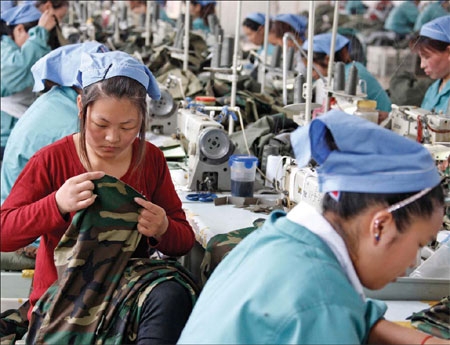There's a trade chill, and it's here to stay
Updated: 2012-02-17 11:14
By Yan Yiqi (China Daily European Edition)
|
|||||||||||
|
 Exports from China to the European Union fell last month because of the bleak economic climate in Europe. [Provided to China Daily] |
Debt crisis in Europe continues to put pressure on bilateral trade
Shrinking demand from debt-stricken European markets is expected to continue to affect bilateral trade, in particular exports between China and the European Union, in the first quarter.
Last month bilateral trade between China and the EU hit $42.7 billion (32.5 billion euros), 7.1 percent lower than a year earlier. Exports amounted to $28.2 billion, a fall of 3.2 percent year-on-year, while imports fell 14 percent to $14.4 billion.
The trade surplus grew 11.3 percent to $13.8 billion due to the decline in imports, figures from the General Administration of Customs on Feb 10 show.
China's overall exports last month fell 0.5 percent from a year earlier, the first monthly drop in more than two years.
The administration said that fewer working days last month resulted in the export decline. "Disregarding the seasonal factors, China's exports posted double-digit growth," it said.
However, some experts say seasonal factors were not the main reason for the declines and that the trend will continue in the coming months.
"The week-long Spring Festival, which led to fewer working days, was one of the reasons for the sluggish trade volume in January, but it was not the main cause," says Xiong Hou, vice-director of the Economy Office of the Institute of European Studies at the Chinese Academy of Social Sciences.
The fall in exports could be largely attributed to weakening demand from Europe because there is no clear sign of a recovery from the debt crisis, Xiong says.
"We predict that the debt crisis in Europe will continue to worsen in the first half of 2012, so its demand for Chinese goods will also fall At least in the first quarter of this year it may not be possible to avert a decline in exports."
Export-oriented companies in China have been feeling the winter chill since the beginning of the year.
Cai Rongbiao, a Wenzhou entrepreneur running an OEM factory of luxury watches in Zhengzhou, Henan province, says: "What we can make out from January is that business could be very difficult in coming months, because regular customers have cut 60 percent of their orders, compared with the same period last year.
"Some potential European trade has failed to materialize, and existing customers keep wanting lower prices, which is keeping profit margins down. At the same time, the costs of labor and raw materials are rising."
Cai says that faced with the possibility of Europe and the United States needing more time to recover from their crises, he is considering moving the focus of his company to emerging markets like Brazil and India.
Experts are also warning Chinese companies to be alert to possible trade friction between China and the EU this year.
"For European countries, protecting their local companies and industries is essential. So there might be more serious trade friction between Europe and Chinese companies," says Lan Qingxin, director of the Institute of International Economy at the University of International Business and Economics.
However, the EU is eager to solve trade problems with China, which is positive for China's trade relationship with Europe in the long run, he says.
"Apparently, Europe is looking for more Chinese investment, and that is a good sign for Chinese companies."
At the 14th EU-China Summit in Beijing on Feb 14, China and the EU reached consensus on key economic matters including promoting two-way investment and expanding trade.
Today's Top News
Rescuers race against time for quake victims
Telecom workers restore links
Coal mine blast kills 18 in Jilin
Intl scholarship puts China on the map
More bird flu patients discharged
Gold loses sheen, but still a safe bet
US 'turns blind eye to human rights'
Telecom workers restore links
Hot Topics
Lunar probe , China growth forecasts, Emission rules get tougher, China seen through 'colored lens', International board,
Editor's Picks

|

|

|

|

|

|





